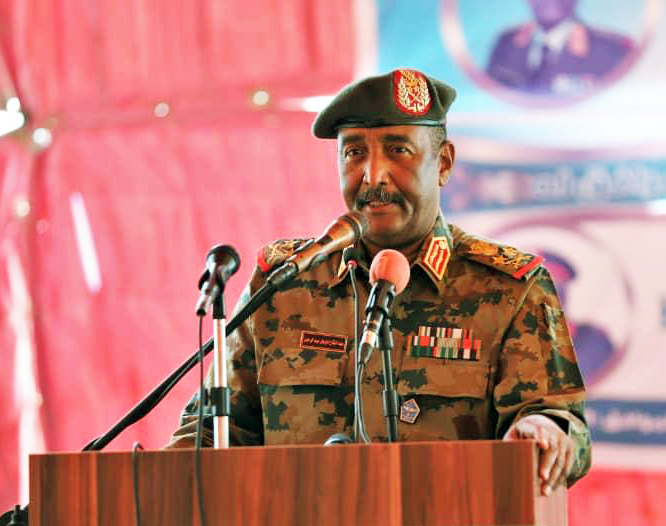RSF dissolved: Sudan legal expert questions constitutional decree

The head of Sudan’s Sovereignty Council, Lt Gen Abdelfattah El Burhan (File photo: SUNA)
In a recent interview with Radio Dabanga, legal expert Nabil Adib delved into the legal implications of the two constitutional decrees that effectively dissolved the Rapid Support Forces (RSF) and abolished the RSF Law of 2017. The decrees were issued from Port Sudan on September 6 by Lt Gen Abdelfattah El Burhan, chairperson of the Sovereignty Council and commander-in-chief of the Sudanese Armed Forces (SAF).
According to yesterday’s decree from Port Sudan, El Burhan states that “this decision comes in response to the rebellion of these forces against the state, their grave violations against civilians, and their deliberate sabotage of the country’s infrastructure”.
The SAF commander issued another constitutional decree on the same day, repealing the Rapid Support Forces Act of 2017 and its 2019 amendments. The decree stipulates that “this decision stems from the RSF’s violation of the objectives, tasks, and principles outlined in the Rapid Support Forces Act of 2017”.
Legal expert and human rights defender Nabil Adib offered insights into the legal implications of El Burhan’s underscored in an interview with Radio Dabanga that the abolition of the RSF Law of 2017 requires legislative action rather than a constitutional decree.
Nevertheless, he acknowledged that the law’s impact on the legal landscape has “significantly diminished due to the RSF’s dissolution in April, rendering it non-existent in a legal sense.”
On April 17, El Burhan officially dissolved the RSF, under the command of Lt Gen Mohamed ‘Hemedti’ Dagalo, declaring the paramilitary group a ‘rebel force’. The decision to dissolve the RSF was well within the legal and constitutional authority of the SAF commander-in-chief, Adib said.
Originally established as a combat force with ties to security forces, the RSF became affiliated to the Sudanese army following the enactment of the RSF Law in 2017. Adib highlighted the significance of Article 35 in the Constitutional Document, which explicitly specified its affiliation with the commander-in-chief of the SAF.
From a practical perspective, Adib clarified that despite the RSF’s dissolution, it remains bound by the laws of war and neutrality, as outlined by international humanitarian law and the Fourth Geneva Convention.
Consequently, he explained, “they are obliged to engage in acts of war only within the boundaries defined by international rules of war, which delineate acts of violence in the context of combatants and explicitly prohibit their use against protected persons”.











 and then
and then